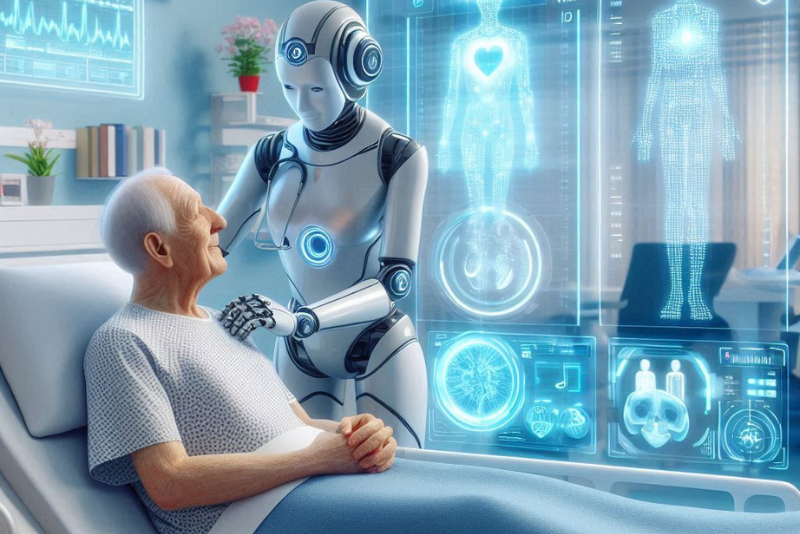AI in Healthcare Artificial Intelligence (AI) is no longer just a futuristic concept—it’s a life-saving tool in today’s healthcare industry. In 2025, AI is helping doctors detect diseases earlier, improve treatment plans, and even assist in surgeries. Hospitals, clinics, and health startups worldwide are adopting AI-driven technologies to save time, cut costs, and most importantly, save lives.
In this article, we’ll explore the real-world applications of AI in healthcare in 2025, its benefits, challenges, and what the future holds.
1. AI-Powered Disease Diagnosis
One of the most impactful uses of AI in healthcare is early disease detection.
- AI algorithms can analyze X-rays, MRIs, and CT scans faster and more accurately than humans.
- In 2025, AI systems like Google’s DeepMind Health and IBM Watson Health are detecting cancer, heart diseases, and neurological conditions at an early stage.
- For example, AI can spot lung cancer in CT scans years before traditional methods might.
👉 This means faster treatment and a higher chance of recovery.
2. Personalized Treatment Plans
Every patient is unique, and AI helps doctors design personalized treatment plans based on:
- Genetic information
- Lifestyle data (diet, exercise, habits)
- Medical history
AI tools can suggest which medications will work best for an individual and predict potential side effects. In 2025, companies like Tempus are using AI to recommend targeted therapies for cancer patients, improving survival rates.
3. AI in Robotic Surgery
Robotic-assisted surgery isn’t new, but in 2025, AI makes it smarter and safer.
- Surgeons now use AI-powered robots for delicate operations, such as heart and brain surgeries.
- These robots provide pinpoint precision, reducing errors and speeding up recovery times.
- AI can also analyze surgical data in real time, guiding doctors during complex procedures.
👉 Patients benefit from shorter hospital stays and less post-surgery pain.
4. Virtual Health Assistants & Chatbots
With healthcare staff often overwhelmed, AI chatbots and assistants are stepping in.
- Virtual assistants powered by AI answer patient queries, schedule appointments, and offer medication reminders.
- In 2025, AI chatbots are advanced enough to provide basic medical advice based on symptoms.
- For rural areas with limited access to doctors, these tools act as first responders for health concerns.
5. AI in Drug Discovery
Developing a new drug used to take 10–15 years. AI has changed that.
- AI models can predict how different molecules will interact, speeding up the drug discovery process.
- In 2025, pharmaceutical companies are using AI to design drugs for rare diseases that were once overlooked.
- During the COVID-19 pandemic, AI proved its worth by helping researchers test vaccine possibilities in record time.
👉 Now, treatments for diseases like Alzheimer’s and Parkinson’s are moving forward thanks to AI-driven research.
6. Remote Patient Monitoring
Wearable devices and smart health apps have become more advanced in 2025.
- Devices like smartwatches can track heart rate, oxygen levels, and sleep patterns in real-time.
- AI analyzes this data and alerts doctors if there are any warning signs.
- For patients with chronic conditions like diabetes or hypertension, AI ensures continuous monitoring without frequent hospital visits.
7. Predictive Analytics in Healthcare
AI isn’t just treating patients—it’s predicting future health risks.
- By analyzing lifestyle, genetics, and medical data, AI can predict who is at risk of diseases like diabetes, heart failure, or stroke.
- Hospitals are using this data to provide preventive care, reducing hospitalizations and saving lives.
👉 Preventing illness is always better than curing it—and AI makes prevention smarter.
Benefits of AI in Healthcare
✅ Faster diagnoses and treatments
✅ Reduced human errors in medical decisions
✅ Personalized care tailored to individuals
✅ Lower healthcare costs over time
✅ Improved accessibility, especially in rural areas
Challenges of AI in Healthcare
Of course, AI isn’t perfect. In 2025, healthcare systems still face challenges such as:
- Data privacy concerns (protecting patient records)
- Bias in AI algorithms (if trained on limited datasets)
- Job displacement fears among healthcare workers
- High costs of adopting AI in smaller clinics
👉 The key is to use AI as a support tool, not a replacement for human doctors.
The Future of AI in Healthcare
Looking ahead, AI will continue to evolve:
- AI doctors may assist in primary consultations.
- Nanobots powered by AI could deliver drugs directly to infected cells.
- Global AI health networks may share medical data across countries to fight pandemics faster.
By 2030, AI may become as common in hospitals as stethoscopes are today.
Final Thoughts
AI is not replacing doctors—it’s empowering them. In 2025, artificial intelligence is already saving lives through faster diagnoses, personalized treatments, and advanced robotic surgeries.
The future of healthcare is a partnership: AI provides the tools, and doctors provide the human touch. Together, they’re building a healthier tomorrow.
FAQs
1. How is AI used in healthcare in 2025?
AI is used for disease diagnosis, robotic surgeries, personalized treatment, drug discovery, and patient monitoring.
2. Can AI replace doctors?
No. AI assists doctors by analyzing data and suggesting treatments, but human judgment remains essential.
3. Is AI safe in healthcare?
Yes, when properly monitored. AI reduces errors and improves accuracy, but it must always work alongside medical professionals.
4. Which diseases can AI detect?
AI can detect cancer, heart disease, diabetes complications, neurological disorders, and more—often earlier than humans can.
READ ALSO: Top 10 Free AI Tools for Students in 2025
